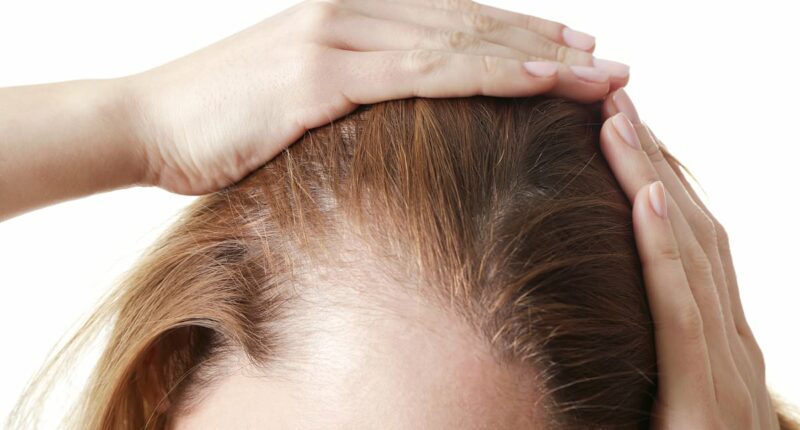Share this @internewscast.com
Thousands of individuals using GLP-1 medication for weight loss have reported changes in hair thickness, and a new study corroborates this connection.
The drugs, known for suppressing appetite, have transformed obesity treatment, yet recent research reveals they may elevate the risk of rapid hair thinning and contribute to both female and male pattern baldness.
These medications, classified as GLP-1 receptor antagonists and marketed as Ozempic for diabetes management and Wegovy for weight control, emulate a gut hormone to help regulate appetite and blood sugar levels.
In the UK, the NHS prescribes these jabs to fewer than 200,000 individuals, while health think-tank the King’s Fund estimates over 1.4 million people are using them privately.
Although the jabs deliver transformative results, they have sparked controversy due to numerous accounts from users who, while praising their weight loss benefits, also report troubling hair loss, leading, in severe instances, to bald spots.
The US Food and Drug Administration (FDA) launched an inquiry in January 2024 into the suspected link between the jabs and alopecia, though research indicates that hair loss affects less than 5 percent of overall users.
But now US researchers have linked GLP-1s to rapid hair loss—medically known as telogen effluvium (TE)—male and female pattern baldness, and nonscarring hair loss.
However, they noted no association with alopecia areata—an autoimmune disease that attacks the body’s hair follicles—was discovered.

Weight loss jabs are not only helping people lose the weight—thousands of users say their hair is falling out too. Experts now say that doctors need to be more proactive about mitigating the risk and counselling patients who are eligible for the jabs
Presenting the study at the European Academy of Dermatology and Venereology 2025 Congress, senior author Yagiz Matthew Akiska, said: ‘[GLP-1’s] metabolic and cardiovascular benefits are at this point pretty well established.
‘However, as their prescribing expands [we] are are seeing more and more unexpected side effects being reported in the literature.
‘One of the most interesting ones that we are seeing is hair loss, specifically nonscarring hair loss.’
He added: ‘As clinicians should recognise that hair shedding and hair loss is an emerging, real-world side-effect of GLP1-s.’
In the current retrospective study, researchers from the George Washington University School of Medicine and Health Sciences, analysed over 1 million patients who did not have a history of hair loss or other causes, such as thyroid disease, for the condition.
Adjusting for potentially confounding factors such as age, sex, race and BMI, they identified 547,993 GLP-1 users who had filled at least two prescriptions for the jabs and had at least two health visits between 2014 and 2024.
These participants were matched with 547,993 non-users who also did not have a history of—or predisposition to—hair loss.
Over the 10-year period, the incidence of rapid hair loss, pattern baldness and nonscarring hair loss all increased to a greater extent in patients on the weight loss jabs than in non-users.
They found that after just six months of being on the jabs, a person’s risk of nonscarring hair loss increased by 26 per cent.
And for pattern baldness—a common cause of hairloss in both men and women, characterised by a receding hairline which eventually progresses to partial or complete baldness in men—the risk was even greater, at 62 per cent.
After a year, the risk of rapid hair loss was greatest, with the chances of developing the distressing condition being 76 per cent higher with weight loss drug use.’
Mr Akiksa said: ‘For many patients, hair loss becomes pretty important as a side effect because they’re also trying to lose weight, they’re concerned about their appearance, or they’re trying to control their diabetes.
‘On top of it, they’re dealing potentially with hair loss, which can be very debilitations for them.’
Whilst this class of drugs work by by targeting receptions that relate to digestion and insulin production which aren’t directly linked to hair growth, the stress on the body—caused by rapid weight loss—can interfere with the hair’s natural cycle.
Dr Roshan Vara, a hair transplant surgeon, previously told the Daily Mail that a dramatic change in nutrient intake can trigger deficiencies in essential nutrients hair requires to grow.
‘Products like Mounjaro or Wegovy can mean patients are unintentionally placed under a calorie restriction,’ Dr Vara explained.
‘This restriction causes your skin and hair to suffer as the body prottises essential functions, diverting nutrients away from our hair and into internal organs.’
But the good news is that once nutrients are reintroduced, the hair will begin to grow back, though it could take up to six months.
As such, Dr Akiska said: ‘We should start thinking about more proactive strategies to mitigate these risks.’
Doctors have advised weight loss jabbers to pay close attention to what they are eating and drinking, even in they have a reduced appetite, and to speak to a medical professional if hair loss persists despite managing stress and eating a nutrient-dense diet.
Mr Michael Buontempo, a resident physician at Dartmouth-Hitchcock Medical Centre, who was not involved in the current study, told Medscape Medical News: ‘Hair loss matters for quality of life, but it’s usually reversible.
‘The best mitigation is pacing weight loss and maintaining nutrition rather than stopping effective therapy.’
Mr Buontempo added that the current study reinforces what doctors are seeing elsewhere, but stressed that this suggests that hair loss is one of the many side effects of rapid weight loss, rather than the drug itself.
















